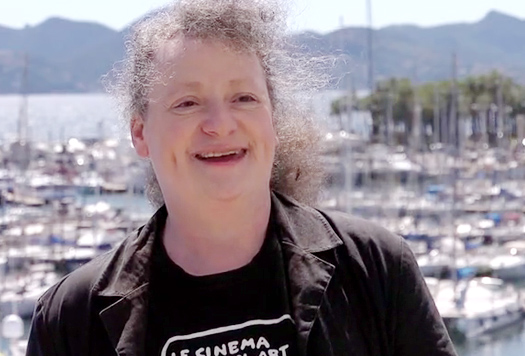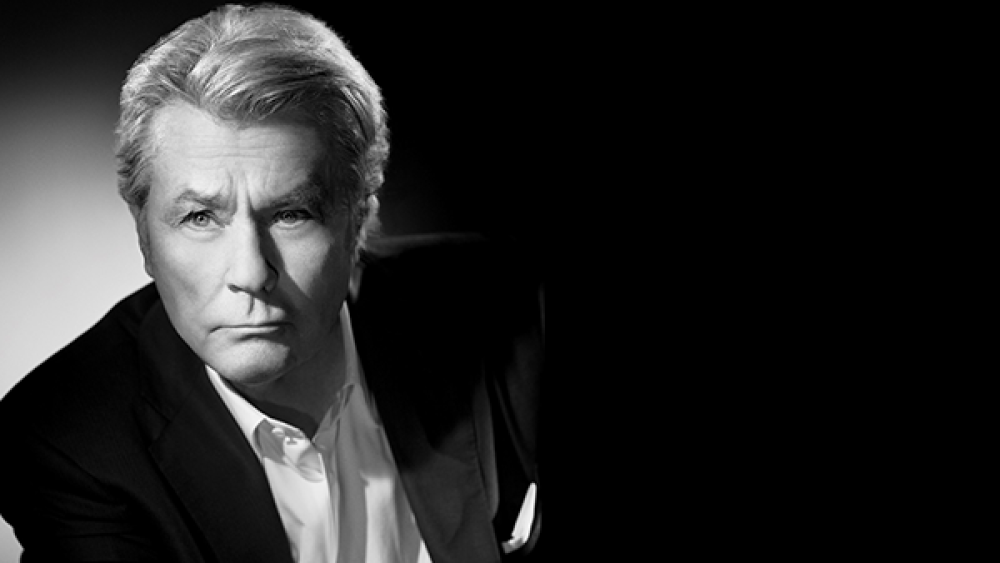If you’ve ever seen “The Leopard” or “Rocco and His Brothers” or “Purple Noon” or “La Piscine” or “Le Samourai” then you know that the young Alain Delon’s unearthly physical beauty and the talent to go with it were gifts to movie-goers the world over.
If the name Alain Delon means little to you, I suggest you do a search. And if the first items that come up claim that the iconic 83-year-old French actor is a racist and sexist homophobe who shouldn’t have been honored by the Cannes Film Festival on Sunday May 19, please climb into the nearest time machine and set the dial to “saner times.”
Over 25,000 people have signed a petition chastising the world’s most important film event for giving an Honorary Golden Palm to Delon for his cinema career. Since we don’t have the signers’ full names, we can’t single them out for a much-needed education that puts Delon in context.
Delon is being accused of being a homophobe because he has expressed the opinion that same sex couples shouldn’t adopt children. Public figures in a free society are allowed to have opinions. Even retrograde to cockamamie ones.
But let’s look at Delon’s actions rather than his words. Delon was fast friends with his mentor, Italian master Luchino Visconti, who never pretended to be straight as most gay men of his generation felt obliged to do (he was born in 1906).
In 1969—when gay-bashing was considered a sport and homosexuals had no rights or protections to speak of—Delon reportedly stated that he had no inclination to sleep with another man, but if he did, it would be nobody’s business but his own. That was a spectacularly brave pronouncement for an incandescent international star to make at the time.
Delon has always credited women for pushing him to act and is quick to state his gratitude toward what used to be called the fairer sex for launching his career. Here in Cannes he made his point over and over.
As he left school early to join the army, fighting for three years in Indochina, Delon says he had no aptitude for writing and instead used his power (he was a nobody in 1957 and a planetary star two years later thanks to his charismatic turn as Ripley in “Purple Noon”) to help other actors and to produce movies about difficult subjects.
The first film Delon produced, in 1964, was Alain Cavalier’s “L’Insoumis,” one of the rare French films to criticize the Algerian war. (Cavalier, who is three years older than Delon, premiered his latest documentary in Cannes this week. Claude Lelouch, 81, who won the Golden Palm in 1966 for “A Man and a Woman” premiered his 49th film in Cannes on the 18th. And Elle Fanning, who turned 21 in April, is a member of the jury. You can’t accuse Cannes of being age-ist.)
When Romy Schneider’s career was dead in the water as it were, Delon told the producers of “La Piscine” that if they didn’t cast her, he wouldn’t make the movie. They relented. (At first they wanted Angie Dickinson.) Jacques Deray’s deeply sexy and suspenseful 1969 thriller was a massive hit, is considered to be a classic (it was remade in 2015 by Luca Guadagnino as “A Bigger Splash” starring Tilda Swinton and Ralph Fiennes) and single-handedly re-launched Schneider’s subsequently flourishing career.
Delon produced important movies in a spirit of exemplary tolerance. Case in point, the brilliant “Mr Klein” in 1976. Nobody was falling over themselves to so much as allude to the fact that in 1942, under Vichy rule during the German Occupation, the shamefully complicit French police efficiently rounded up 13,000 French people and handed them over to the Nazis for deportation from which few returned.
Delon hired American director Joseph Losey, a Communist who had gone into exile in England as a victim of McCarthy-era blacklisting. Delon hired Communist screenwriter Franco Solinas (whose other scripts include “Battle of Algiers” and “State of Siege”) although Delon himself was a Gaullist. And he also starred in the impressively subtle story of a well-to-do art dealer named Robert Klein, a gentile, whose life enters Kafka territory when he starts receiving mail for another man named Robert Klein, who is Jewish. It was Delon who insisted on changing the ending from relatively happy to haunting and devastating.
Delon has no training as an actor but he turned out to be a superb screen presence: lithe and supple, impossibly gorgeous and utterly virile. He fell into performing and proved to be perfectly suited to it, not unlike Burt Lancaster (who got his start as a circus acrobat) or Steve McQueen.

Sunday evening in Cannes, addressing a packed house that included French government ministers, Academy of Motion Picture Arts and Sciences president John Bailey and film director and historian Bertrand Tavernier, Fremaux explained that the Honorary Palm has been awarded nine times previously, including to two-time jury president Jeanne Moreau, to Clint Eastwood, to Agnes Varda (who died two months shy of her 91st birthday at the end of March and graces the Festival poster) and to Woody Allen.
At the start of the Festival, Fremaux was asked about the petition urging Cannes to rescind Delon’s honorary palm. Some observers think Fremaux’s reply was too flippant but it did put the knee-jerk context-free ridiculousness of the anti-Delon petition where it belongs — which is being duly noted and then vigorously ignored. Fremaux said that Delon is fully entitled to hold objectionable views and that an Honorary Palm “is not the Nobel Peace Prize.” He also parried that the petition’s originators might do better to launch a petition against global warming, given the deadly environmental policies of the Trump administration. Permit me to insert a French term here: Touché.
A sustained roar of approval and seemingly endless applause filled the auditorium when Delon arrived for the tribute Sunday night. Fremaux pointed out that those who came to Cannes any earlier than Delon’s first trip are few and far between—Delon first walked the red carpet in 1956 with his friend Jean-Claude Brialy. The late Brialy told Fremaux that although Delon was nobody and Brialy was already an established actor, all eyes—male and female—were on Delon. As Delon puts it, “It seems I wasn’t too unpleasant to look at at the time.”
Before launching an incredibly moving tribute reel, Fremaux stated, “In all the supposedly moral battles raging now and to come, the Festival will always be on the side of the artists.” Hear, hear. Cannes programmers and organizers don’t have a tin ear for the goals of the #MeToo movement—think of it instead as having a tuning fork for what has been accomplished and endures in the realm of cinematic artistry.
For reasons of his own, Delon refused to recognize the son he fathered with Velvet Underground vocalist and iconoclastic musician Nico, but his actress daughter Anouchka Delon presented her dad with his gleaming metal palm frond trophy after a lovely speech noting that he has made 89 films in 62 years.
“The one thing I’m completely proud of, is my career,” said Delon, who was moved to obviously genuine tears at several junctures in the evening and during the outstanding 90-minute public conversation he’d had earlier in the day with Le Monde film writer Samuel Blumenfeld.
After the Palm-awarding ceremony, grateful attendees stayed for “Mr Klein.” Watching the film for the first time in decades, I was swept away by its unfortunate pertinence about populations pegged as undesirable, its outstanding design and Delon’s precise, unnerving performance as the title cipher. Asked on French TV on Opening Day how I felt about giving Delon an award I said, “Unless he kicks a dog all the way up the red-carpeted steps, I’m unconditionally in favor of honoring Delon in precisely this way.”
Imagine my surprise when, in the film, Mr Klein goes out to buy a newspaper across the street from his apartment whose beautiful furnishings and artworks have been confiscated by the authorities. A dog follows him back home. And Mr Klein kicks it.












